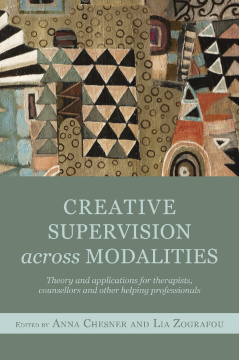
BOOK
Creative Supervision Across Modalities
Anna Chesner | Jane Leach | Hannah Sherbersky | Amanda Strevett-Smith | Eleni Ioannidou | Céline Butté | Fiona Hoo | Cath Wakeman | Denise McHugh | Lia Zografou
(2013)
Additional Information
Book Details
Abstract
Creative methods can bring depth and new perspectives to the supervision process. This book proposes that a firm understanding of supervision theory is the vital foundation to utilising the power of creativity in reflection and learning, and demonstrates that these creative approaches are applicable across disciplines, providing useful reflective tools across and beyond the arts therapies.
Part One of the book provides a theoretical approach to supervision, with a presentation and discussion of the philosophy, theory and place of creative technique. Part Two demonstrates the fluency of creative approaches to supervision with examples of application within different fields, including dramatherapy, psychodrama, family therapy, art therapy, psychoanalytic psychotherapy, dance and movement therapy and church ministry, provided by experienced practitioners from within those fields.
Based in the practice and philosophy of the Creative Approaches to Supervision Diploma course run by the editors and taught at the London Centre for Psychodrama Group and Individual Psychotherapy, this book is a comprehensive resource for anyone with an interest in supervision across the caring and educational disciplines.
This much-needed cross-disciplinary book adds to the current literature on supervision. It will be indispensable to practitioners and students from a range of modalities. Each chapter thoughtfully illustrates a suggested model, resulting in a tightly structured volume. Creative practice fits into a common theory whilst inviting key topics in supervision to be considered.
Professor Helen Payne, University of Hertfordshire, UK
The authors have done an excellent job in blending theory and creative methods in a very readable and accessible form, demonstrating their core belief that intentional focus on creativity enhances supervisor practice. They have included contributions from very different fields and combined them in a skilful way that gives the book a coherence within the diversity, and leaves the reader with the desire to experiment more within their own supervisory practice.
Robin Shohet, editor of Passionate Supervision and Supervision as Transformation
This book imaginatively combines theory and creative approaches to supervision, and is a must-read for both supervisor and supervisee. It is written in a manner that is both informative and practical, yet it also challenges the supervisor to move beyond the cultural conserve of supervision. It has a strong theoretical grounding that acknowledges the work and creativity of others and introduces innovative ideas from dramatherapy, psychodrama and playback theatre to enrich the supervisory experience.
Jinnie Jefferies, Founder and Co-director, London Centre for Psychodrama
Good to see another helpful addition to the books on supervision, especially one which illustrates how “supervision should be a sand-pit in which we play, more than a law-court in which we judge”. The authors draw on their experience as psychodramatists and creative therapists to show how supervision can be a rich place of creativity, experimentation and learning through play in its deepest sense. The book includes many useful approaches for using art, enactment and embodied approaches in a variety of supervision settings. It will be particularly useful for those supervising the creative therapies.
Professor Peter Hawkins, co-founder and Director of the Centre for Supervision and Team Development (www.cstdbath.co.uk)
